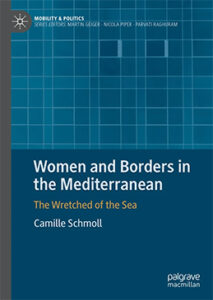 The Wretched of the Sea
The Wretched of the Sea
This book is a translation from the French language edition: “Les damnées de la mer: Femmes et frontières en Méditerranée” by Camille Schmoll, published by Éditions La Découverte in 2020. It offers a history of migration in the Mediterranean written about and from the perspective of women. It gives a complex picture of individual journeys of migrant women, and in a radical departure from the miserabilist or culturalist approach through which women are usually viewed, the book argues for a politically and socially aware, activist feminism that is attuned to what border-obsessed migration policies actually do to women.
The research presented in this book is based on multi-sited fieldwork that led the author to closely follow migration survivors. The book depicts the journey of women as they experience brutal separations, have to make heart-wrenching decisions and end up wandering from one place to another, but also as they make acquaintances and find new opportunities. The first-person accounts collected here demonstrate that the reasons behind these women’s decision to leave are anything but simple and linear: they combine various forms of persecution and oppression, a desire for autonomy and a yearning for new horizons, as well as changes in gender relations in their countries of origin.
The book further explores the daily lives of women in reception centres, where they are in limbo, their journey as if “suspended,” as they wait for this Europe rejecting them to acknowledge their presence. These women live on and “in” the border – a border that relentlessly haunts them and pursues them everywhere they go. Boredom is constant and, likewise, racism and marginalisation processes are pervasive. At the same time, this study shows that these women are also resisting, strategising, taking charge of their own destinies and journeys, and looking for a way out.
Written from the standpoint of a geographer, this study accordingly puts the space of everyday life front and centre. Such a space acts as an impediment to these women’s journeys: it generates a “moralscape” of waiting, which plays a key role in these women’s daily lives.However, it can also help these women gain greater autonomy, thus empowering them, and it may be subverted through various tactics and stratagems, which sometimes take the form of spatialised strategies.
Camille Schmoll’s book is an essential book today. It is a book by a feminist, a geographer, an ethnographer who knows how to combine the rigour of research with the passion of political commitment. It is a book that shows what is at stake in the Mediterranean, beyond the shocks caused in public opinion by particularly tragic events—shocks that are immediately followed by “a saturation effect.” It is a book that calls for the construction of a discourse and a practice different from those generically “humanitarian,” and rather hinged on the set of contradictions, clashes, differences in power levels that in the Mediterranean are refected in a particular light, but whose geographies are much wider. The African women whose stories and practices populate the pages that follow will certainly not be the last to reach European shores. “Surely,” as the last words of the book say, “women will not stop moving…”.
Sandro Mezzadra, Forword, xi
 Camille Schmoll is Research Director at École des Hautes Études en Sciences Sociales (EHESS), Fellow of the Institut Convergences Migrations, and a member of the Géographie-cités research centre, France. A feminist political geographer, she is especially interested in gender and migration issues, critical migration studies, and reflexivity within migration scholarship. Her work explores migration from an ethnographic perspective, with a particular focus on the making of border-places (e.g. islands, cities, neighbourhoods) and the trajectories of migrant women. She was Editor-in-Chief of the peer-reviewed journal Revue Européenne des Migrations Internationales from 2019 to 2022, and has authored, co-authored and co-edited several books in French, Italian and English.
Camille Schmoll is Research Director at École des Hautes Études en Sciences Sociales (EHESS), Fellow of the Institut Convergences Migrations, and a member of the Géographie-cités research centre, France. A feminist political geographer, she is especially interested in gender and migration issues, critical migration studies, and reflexivity within migration scholarship. Her work explores migration from an ethnographic perspective, with a particular focus on the making of border-places (e.g. islands, cities, neighbourhoods) and the trajectories of migrant women. She was Editor-in-Chief of the peer-reviewed journal Revue Européenne des Migrations Internationales from 2019 to 2022, and has authored, co-authored and co-edited several books in French, Italian and English.


